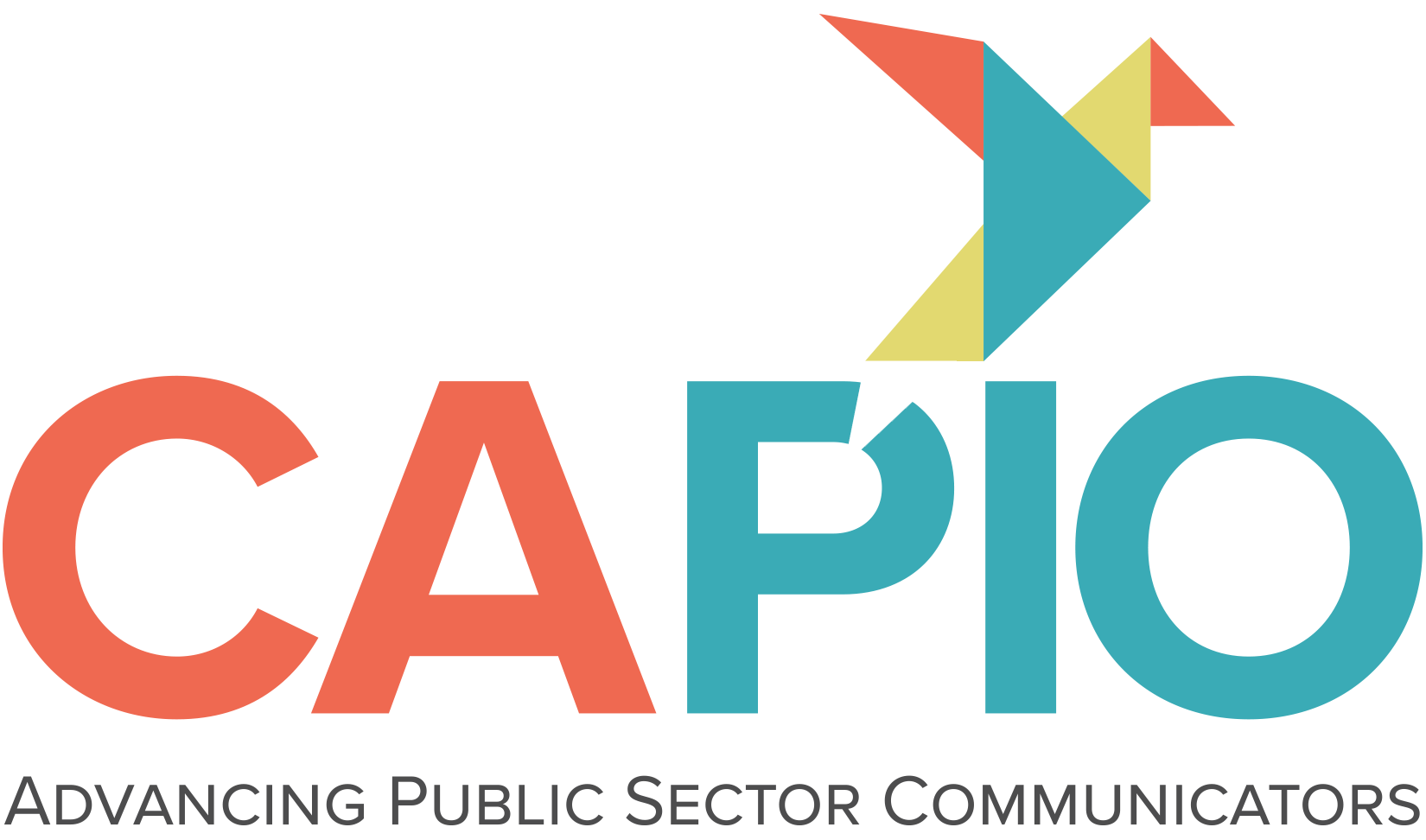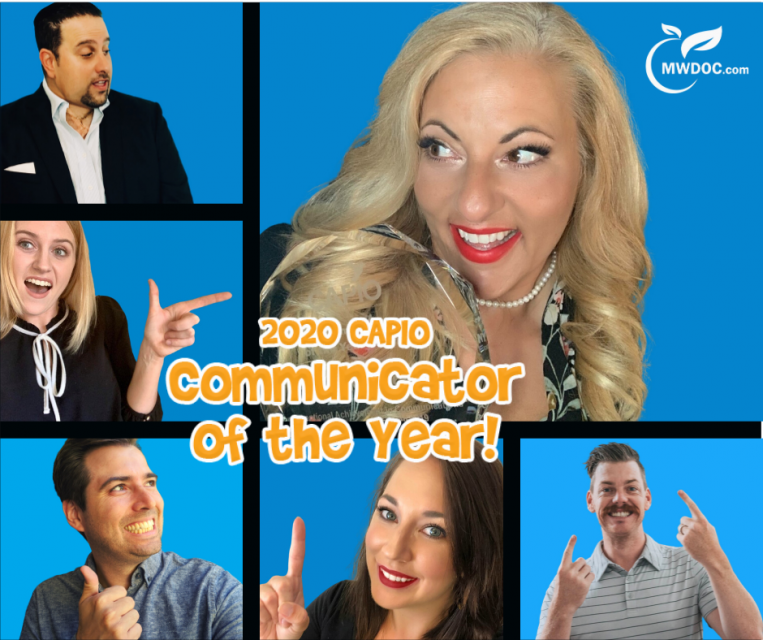CAPIO Communicator of the Year and utility PIO offers how she and her team are getting through a tough year
Perspective from Tiffany Baca, Public Affairs Manager, Municipal Water District of Orange County
As the COVID-19 pandemic continues to upend the world, utility providers are also experiencing increasing uncertainty that will be challenging to navigate. While utilities are resilient, having experienced and weathered crises in the past, the unique and unprecedented nature of this pandemic and its consequences are creating an entirely new experience.
Hear from Tiffany Baca, public affairs manager for Municipal Water District of Orange County and CAPIO’s 2020 Communicator of the Year on how she is supporting herself, her teams and her communities.
What are the top five ways you have been able to personally navigate this season of crisis?
With 2020 more than halfway over, it is turning out to be one of the toughest years many of us have faced in our lifetimes. However, I think it’s also been a year of introspection, clarity, growth, and renewed commitment. Each moment is an opportunity for evolution if we choose it to be. This is a painful, heartbreaking time for so many, although, we are rising from these hardships with more awareness, determination, and compassion, and that inspires me. I’m learning more about who I am and who others are around me because we are awakening.
I’ve been able to personally navigate this difficult time by:
- Introspecting and acknowledging the ways I can grow. I don’t see imperfections as flaws or failures, but rather as an opportunity to level up, both as a human being and as a professional.
- Learning and listening. I’m excited by the fact that I have a lot to learn and will never be finished! Because of this, I expect I won’t ever be bored, and will always have something useful or positive to contribute to a plan, conversation, or cause.
- Being of service. It’s hard work and gives me purpose. I’ve found that you can’t be disappointed in yourself or disheartened in your progress if your actions are selfless.
- Actively seeking problems that I can help solve both personally and professionally. I love a good challenge, and since a good portion of life is problem solving, there is never a shortage! I do recognize a need for balance though, and have to work to keep my enthusiasm in check so I don’t take on more than what I can realistically do.
- Practicing intentional gratitude. I am grateful for every experience and every interaction – good or bad. Each time I start a difficult climb, either towards understanding others or reaching goals I have set for myself, I feel like I have a head start. Gratitude helps me find grace in others, and in myself, so I can approach problems in a good place and with a clear head.
How is your team supporting your organization and community?
Since shifting to a virtual environment back in March 2020, we’ve had to take a hard look at everything we do and why we’re doing it. As a communications team, our primary job has been to interface with the public in order to educate and inspire action. Accomplishing this in person was much easier because we had real power to connect with others through touch, quality time, and genuine dialogue. While we certainly miss our face-to-face community events, workshops, and tours, we are still responsible for interfacing with our member agencies and the public to provide an exceptional experience.
Here is how MWDOC’s communications team is supporting our organization and community:
- Treat every person you interact with like a V.I.P. We talk about communicating with others all the time, but in order to do that effectively, we have to connect with them first. People are more likely to let you know exactly what they need if they don’t have their guard up.
- Go the extra mile. It’s a little more work, but it pays far greater dividends in the long run. Put some extra effort into the details to create an exceptional experience. People aren’t excited or inspired by average.
- Quiet the voices in your own head and start by listening. Each of us are experiencing this time differently. Some have lost homes, jobs, and even loved ones. Some are fighting for justice, and others are afraid. Offering the same pitch to everyone lacks empathy and effort. Every productive conversation begins with an understanding of the other person’s experience.
- Give the people what they want. Make sure that what you are offering makes sense. Periodically evaluate your activities and programs to ensure that what you’re delivering is what’s wanted and needed. Categorize your activities and programs using an evaluation matrix to help clearly identify areas that need attention.
- Say yes. An intentional yes is an opportunity to grow, to learn, to help. To be clear, yes doesn’t have to be what it looks like on the surface. By taking a quick analysis of your time, expertise, and personal needs, an intentional yes can transform into something that works for everyone.
Here is how I’m doing my best to maintain employee engagement:
I’m truly inspired and motivated by the work that I do and I believe my team is too. In order to adapt during this difficult time, we’ve had to rebuild every program, rethink tools and strategies, reimagine events, check in with established partners, and build new relationships so we can continue to be relevant and thrive. The wheels are always turning.
My top three strategies for maintaining engagement and good morale have included:
- Insist on ownership. Everyone on my team has specific responsibilities and actively participates. We each have purpose and contribute to a shared vision. We use project management tools like Asana and CoSchedule to keep track of our individual and team progress, and this holds everyone accountable for their responsibilities. When you own your position and your role, you work as hard as you need to get the job done. Ownership gives you a sense of pride and accomplishment.
- Keep learning! Knowledge is power and today, information is only a click, a webinar, or an article away. We offer skill-building opportunities by assigning tasks outside of job titles. This includes encouraging research and participation in trainings and webinars. Every time you learn something new you become more valuable, not only to yourself but also to others, and that’s a real confidence booster.
- Accept the things you cannot change and change the things you can. Give it your all, and then give yourself a break. We all make mistakes or come up short and shouldn’t be paralyzed by the thought of it. Own it, accept it, fix it, and move on. When it’s okay to make mistakes, you build self-assurance and have space to confidently contribute ideas and suggestions.

